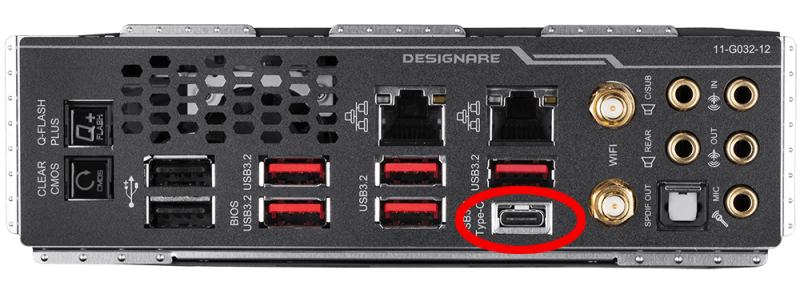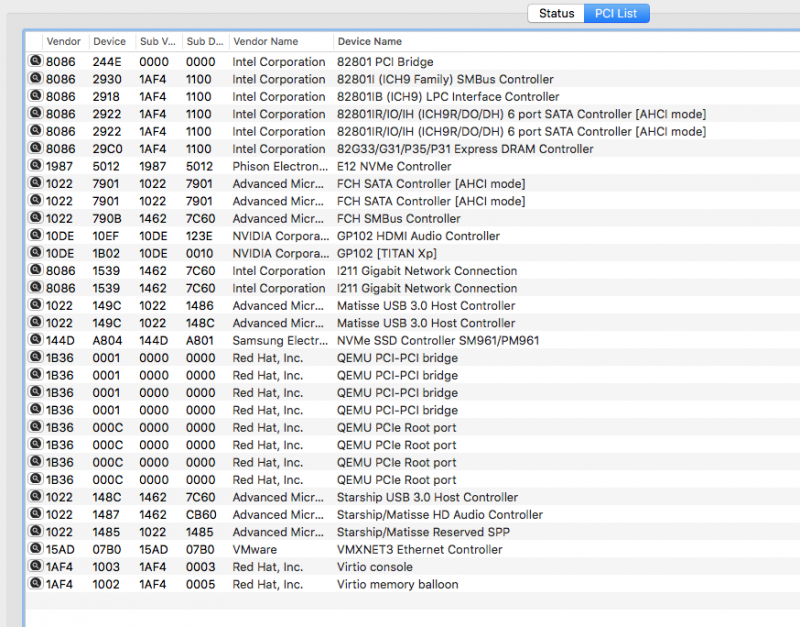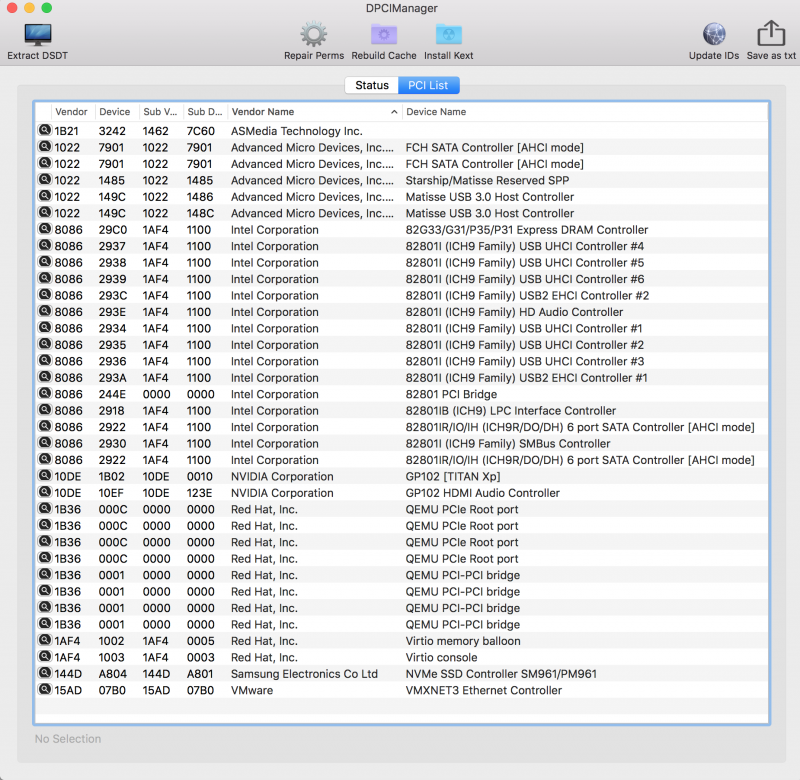Leaderboard
Popular Content
Showing content with the highest reputation on 02/12/2021 in all areas
-
intendo le tue acpi originali, quelle della scheda madre che hai allegato prima e non quelle che usi 🙂1 point
-
Uhm oltre a 2666mhz, se non usi anche Windows, non ha per nulla senso. Le vede "per finta", non le sfrutta e hai problemi durante il wake. Quindi, la risposta è: no. L'iMac 19,1 (o il 18 oppure l' iMacPRO 1,1 , non hanno ram oltre i 2.6GHz...quindi, le vedrebbe ma non le userebbe minimamente...o meglio non vedresti alcuna differenza.) Io monto 3200 overcloccate a 3333 , quindi oltre al profilo X1, ma perchè uso anche Win. Li le vede e le sfrutta. MacOSX (nel tuo caso) e MacOS nel mio, non le sfrutterebbero. Meglio, se vuoi avere 32GB, 4 banchi da 8 piuttosto che 2 da 16 per quanto riguarda prestazioni di timing etc... Ma precluderebbero un "futuro" passaggio a 64 per esempio... Comunque sia, vedi se sui soliti canali trovi magari in sconto o usati 2 banchi da 16 da max 2666 e vivi felice xD LoL ahahha1 point
-
1 point
-
welcome here @boolean 🙂 you have to lock in your bios your great cpu @32 cores 32 threads or 64 core without SMT (better for performance) this is an OSX limits1 point
-
No, no particular lag You have to stress in your ideal pipeline job condition...f it is good for you 🙂 You have an ideal system with black screen it is not ideal (imho)1 point
-
try to enable one on one the latest four..with some combinations it could start..all no1 point
-
1 point
-
before you have to see newer one put #in front your mmiolist in config and check the new mmio list (all skipped to 0 should be (Yoda) 🙂1 point
-
it seems you have changed else maybe CSm or 4g on bios? in this way you could loose some functionality on sleep/wake, reboot or shutdown you have to test1 point
-
simply...have you connected the power on it?1 point
-
Ioreg is a photography of all your system1 point
-
if you check @Ploddlesssdt.aml you will see if inside there are the same your location or in the worst case they are not identical you have to manage them according your ioreg I do not know if @Ploddlesis able to modify it for you..I am not able to do I >Know for sure @iGPUand @Gengik84 are able to do... try to ask them if they have some time to do this for you 🙂1 point
-
No for latest question in your bios you should decide boot option Choose internal disk where you have your booting EFI and save disconnect uSB and see if system starts from your internal disk if starts, with my config (I mean) put here an IOREG to have one, save it, compress it and put here then some people with skill in ssdt creation could help you I do not use any SSDT but if you want to use it is your choice 🙂 About kext..there you can use all kext you need to have a proper WIFI or BT working..I do not use it so you have to ask to users using your same models you have only to add in kexts folder and then declare them in your config in Kernel/add but... before B A C K U P this EFI 😛 and... if you change BIOS settings you could have the need to modify your MMIO...so pay attention 🙂1 point
-
I think you have mixed stuff in two different efi copy completely this refi on your HDD's EFI replace completely then boot always from your HD thanks1 point
-
config.plist 2.zip same as above delete all open core txt debug and do two reboot 11:167 00:001 OCABC: MMIO devirt 0xE2100000 (0x81 pages, 0x8000000000000001) skip 0 11:168 00:001 OCABC: MMIO devirt 0xE3180000 (0x81 pages, 0x8000000000000001) skip 0 11:169 00:001 OCABC: MMIO devirt 0xEF100000 (0x181 pages, 0x8000000000000001) skip 0 11:171 00:001 OCABC: MMIO devirt 0xFA180000 (0x81 pages, 0x8000000000000001) skip 0 11:172 00:001 OCABC: MMIO devirt 0xFA300000 (0x100 pages, 0x8000000000000001) skip 0 11:173 00:001 OCABC: MMIO devirt 0xFEA00000 (0x100 pages, 0x8000000000000001) skip 0 11:174 00:001 OCABC: MMIO devirt 0xFEC00000 (0x1 pages, 0x8000000000000001) skip 0 11:175 00:001 OCABC: MMIO devirt 0xFEC10000 (0x1 pages, 0x8000000000000001) skip 0 11:177 00:001 OCABC: MMIO devirt 0xFED00000 (0x1 pages, 0x8000000000000001) skip 0 11:178 00:001 OCABC: MMIO devirt 0xFED40000 (0x5 pages, 0x8000000000000001) skip 0 11:179 00:001 OCABC: MMIO devirt 0xFED80000 (0x10 pages, 0x8000000000000001) skip 0 11:180 00:001 OCABC: MMIO devirt 0xFEDC2000 (0xE pages, 0x8000000000000001) skip 0 11:181 00:001 OCABC: MMIO devirt 0xFEDD4000 (0x2 pages, 0x8000000000000001) skip 0 11:182 00:001 OCABC: MMIO devirt 0xFEE00000 (0x100 pages, 0x8000000000000001) skip 0 11:183 00:001 OCABC: MMIO devirt 0xFF000000 (0x1000 pages, 0x8000000000000001) skip 0 11:184 00:001 OCABC: MMIO devirt 0x1040000000 (0x10400 pages, 0x8000000000000001) skip 0 11:186 00:001 OCABC: MMIO devirt 0x6EE0000000 (0x10400 pages, 0x8000000000000001) skip 0 11:187 00:001 OCABC: MMIO devirt 0x6F10000000 (0x10400 pages, 0x8000000000000001) skip 0 11:188 00:001 OCABC: MMIO devirt 0xCDB0000000 (0x10400 pages, 0x8000000000000001) skip 0 I have converted these above if you change slot position or bios option they could change and we will become crazy to solve your problem1 point
-
I would start with a more clean config.plist and you would try to solve your problem with your monitor then it is more simple to do the missing optimization (if possible 😛 ) I can't help on bluetooth configuration but you have to solve a problem and then try to solve others 🙂 so use MMIO list I have produced yesterday for you..and try to solve your monitor problem first. How? enabling or disabling whatevergreen kext clearing Nvram.. only you could test then search on bios wake on lan parameter if you have..and maybe also with this you could solve "others" problem (ask to gigabyte users here)1 point
-
Verbose time is pretty fine login time no try to change hdmi or display port you are using also try to disable whatever green kext and if you have black screen without restarting change display port and see if some ports have signal1 point
-
30:390 00:003 OCABC: MMIO devirt 0xEA400000 (0x181 pages, 0x8000000000000001) skip 1 now also this is fine for slowness of booting... now you have a working EFI to start If it was my system I will try to see if it is possible to boot without pikera boot args, Whaevergreen kext and so on AppleAlc is not useful for your internal Realtek audio and , I think you have to follow some indications of others Gigabyte users I do not like to fill my ACPI folder with SSDt , I have no wifi or BT so you could have the need to improve this config.plist pay always attention to your MMIO data, because ie the above one seems not present in Ploddies config..I do not why and I do not know his bios settings however welcome in almost working TRX40 community 🙂1 point
-
config.plist.zip this config have your exact MMIO with I see in debug put in config pikera bootarg and try again post debug log and config used thanks1 point
-
yes because no pikera booting in there..I have thought you have Nvidia.. 48:200 00:054 OCABC: MMIO devirt 0xE2100000 (0x81 pages, 0x8000000000000001) skip 0 48:237 00:036 OCABC: MMIO devirt 0xE3180000 (0x81 pages, 0x8000000000000001) skip 0 48:273 00:036 OCABC: MMIO devirt 0xEA400000 (0x181 pages, 0x8000000000000001) skip 0 48:309 00:036 OCABC: MMIO devirt 0xFA180000 (0x81 pages, 0x8000000000000001) skip 0 48:345 00:036 OCABC: MMIO devirt 0xFA300000 (0x100 pages, 0x8000000000000001) skip 0 48:404 00:058 OCABC: MMIO devirt 0xFEA00000 (0x100 pages, 0x8000000000000001) skip 0 48:440 00:036 OCABC: MMIO devirt 0xFEC00000 (0x1 pages, 0x8000000000000001) skip 0 48:476 00:036 OCABC: MMIO devirt 0xFEC10000 (0x1 pages, 0x8000000000000001) skip 0 48:512 00:035 OCABC: MMIO devirt 0xFED00000 (0x1 pages, 0x8000000000000001) skip 0 48:548 00:036 OCABC: MMIO devirt 0xFED40000 (0x5 pages, 0x8000000000000001) skip 0 48:602 00:053 OCABC: MMIO devirt 0xFED80000 (0x10 pages, 0x8000000000000001) skip 0 48:638 00:036 OCABC: MMIO devirt 0xFEDC2000 (0xE pages, 0x8000000000000001) skip 0 48:674 00:036 OCABC: MMIO devirt 0xFEDD4000 (0x2 pages, 0x8000000000000001) skip 0 48:710 00:036 OCABC: MMIO devirt 0xFEE00000 (0x100 pages, 0x8000000000000001) skip 0 48:747 00:036 OCABC: MMIO devirt 0xFF000000 (0x1000 pages, 0x8000000000000001) skip 0 48:805 00:058 OCABC: MMIO devirt 0x1040000000 (0x10400 pages, 0x8000000000000001) skip 0 48:841 00:036 OCABC: MMIO devirt 0x6EE0000000 (0x10400 pages, 0x8000000000000001) skip 0 48:878 00:036 OCABC: MMIO devirt 0x6F10000000 (0x10400 pages, 0x8000000000000001) skip 0 48:914 00:036 OCABC: MMIO devirt 0xCDB0000000 (0x10400 pages, 0x8000000000000001) skip 0 these are your MMIO with bios you are using by now and they are different from @Ploddlesone posted in OP of other thread My questions are: 1) same BIOS 2)CSM on or off?1 point
-
ok then add pikera boot arg to posted config above 😛1 point
-
so now you have AMD or Nvidia? config.plist.zip delete all your log put this config then repost bootlog txt1 point
-
please do not modify anything otherwise I will be crazy to understand I will explain what I want to do I would like that your system uses your MMIO.. so we have to convert it for you and see if in txt they are skipped to 11 point
-
config.plist.zip in this you have your Exact MMIO test they are pretty similar pay attention if you change on your BIOS, Uefi or CSM they could change so test always with the same bios settings post always open core txt debug log1 point
-
I mean if system is on try to change port where you connect your Monitor other DP, other HDMI I have disabled WEG kext and applealc1 point
-
@Driftwood i would like to suggest you to read this thread https://forum.proxmox.com/threads/vm-w-pcie-passthrough-not-working-after-upgrading-to-6-0.56021/ Here is possible also to understand what that args you add in your vm does i think not necessary but reading that thread you can understand better how a working pcie root/ bridge are related to qemu config... about 47:00 controller..in my case 46:00... you should investigate better 😜1 point
-
@iGPU this is mine, I use a script given on amd discord by @pshirshov user, he should be also here I think with maybe other nickname: IOMMU Group 49: 42:08.0 PCI bridge [0604]: Advanced Micro Devices, Inc. [AMD] Device [1022:57a4] 46:00.0 Non-Essential Instrumentation [1300]: Advanced Micro Devices, Inc. [AMD] Starship/Matisse Reserved SPP [1022:1485] 46:00.1 USB controller [0c03]: Advanced Micro Devices, Inc. [AMD] Matisse USB 3.0 Host Controller [1022:149c] 46:00.3 USB controller [0c03]: Advanced Micro Devices, Inc. [AMD] Matisse USB 3.0 Host Controller [1022:149c] IOMMU Group 50: 42:09.0 PCI bridge [0604]: Advanced Micro Devices, Inc. [AMD] Device [1022:57a4] 47:00.0 SATA controller [0106]: Advanced Micro Devices, Inc. [AMD] FCH SATA Controller [AHCI mode] [1022:7901] (rev 51) IOMMU Group 51: 42:0a.0 PCI bridge [0604]: Advanced Micro Devices, Inc. [AMD] Device [1022:57a4] 48:00.0 SATA controller [0106]: Advanced Micro Devices, Inc. [AMD] FCH SATA Controller [AHCI mode] [1022:7901] (rev 51) to copy examples you did 46:00.0 Non-Essential Instrumentation [1300]: Advanced Micro Devices, Inc. [AMD] Starship/Matisse Reserved SPP [1022:1485] Subsystem: Advanced Micro Devices, Inc. [AMD] Starship/Matisse Reserved SPP [1022:1485] Kernel driver in use: vfio-pci 46:00.1 USB controller [0c03]: Advanced Micro Devices, Inc. [AMD] Matisse USB 3.0 Host Controller [1022:149c] Subsystem: Advanced Micro Devices, Inc. [AMD] Matisse USB 3.0 Host Controller [1022:1486] Kernel driver in use: vfio-pci Kernel modules: xhci_pci 46:00.3 USB controller [0c03]: Advanced Micro Devices, Inc. [AMD] Matisse USB 3.0 Host Controller [1022:149c] Subsystem: Advanced Micro Devices, Inc. [AMD] Matisse USB 3.0 Host Controller [1022:148c] Kernel driver in use: vfio-pci Kernel modules: xhci_pci 47:00.0 SATA controller [0106]: Advanced Micro Devices, Inc. [AMD] FCH SATA Controller [AHCI mode] [1022:7901] (rev 51) Subsystem: Advanced Micro Devices, Inc. [AMD] FCH SATA Controller [AHCI mode] [1022:7901] Kernel driver in use: vfio-pci Kernel modules: ahci 48:00.0 SATA controller [0106]: Advanced Micro Devices, Inc. [AMD] FCH SATA Controller [AHCI mode] [1022:7901] (rev 51) Subsystem: Advanced Micro Devices, Inc. [AMD] FCH SATA Controller [AHCI mode] [1022:7901] Kernel driver in use: vfio-pci Kernel modules: ahci and this is achieved only with: hostpci9: 46:00.1 hostpci10: 46:00.3 hostpci11: 47:00 hostpci12: 48:00 47:00, 48:00 are my sata controllers: Qemu hard disk here is my Catalina on disk file the others are my mechanical disks installed and passed thanks to 47:00, 48:00 controllers1 point
-
hi @Rox67erto fix audio I use ..Catalina in my case but I think also in all trx40 motherboard you have to pass only two USB controllers in my case 46:00.1 and 46:00.3 passing this you have your realtek audio exposed in Catalina and it should work also for you If not , reboot Catalina without audio jack connection (green jack one (speaker output) and connect it after login (I think jack detection is not working well.. ah your right controller should be 47:00.1 and 47:00.3 with only this you can have all usb mapped (testing by now so take as it come and test also by yourself) I can also pass all controllers (and also you can with 3 problematic ones you have to use FLR patch) I discover that for us (trx40 owner I mean) we need to patch 148c ID to pass problematics controllers, I asked to Pavo to build for me a kernel patch for trx40 users adapting the original one for x570 you can find in vfio/reddit post and then He has upload also on his github. and these are all my controller passed I have eliminated old usb vm stuff you can find in /usr/share/qemu-server/pve-q35-4.0.cfg1 point
-
😂😂😂 Catalina internal Realtek 2.0 audio problem....solved 🙂 I have reached my internal peace...no more talking for me about audio (but if you find a way to use internal audio Catalina stuff In high Sierra I will happy to try)1 point
-
Below al controller I can pass in my MSI TRX40 Pro 10G: Marked in light yellow are controllers I can pass using FLR patches (id 148c) All the others mainboard controllers are passed well from first Proxmox release I have installed (6.1) my next goal is audio..ehm joking 🙂 is to understand if all other USB passed are useful or not.. now I will duplicate this vm and disable all usb except 46:00.1 and 46:00.3..my feeling is that all usb will be there again with other usb...1 point
-
in my opinion is an OSX problem (windows VM Is perfect in this), maybe in connection with CPU tsc or frequency..because audio is there..but different problems Then it seems that some audio USB with DAC have no problem Researchingyou can see it is also a problem with usb audio in real Mac..1 point
-
I disagree (in friendship) 🙂 ok a separated disk for any OSX..but then I boot from OC or clover to execute one of them and in my VM test I have also a Catalina OSX on a qemu file. I would like to understand better problems many of you have to pass your controllers From your lspci -nnk I see it is possible to pass all controllers in the same way I do (some of them using FLR patch). Other thing I am very interested is if for you it is mandatory to put stuff on vfio.conf or in blacklist.conf..because it shouldn't (on TRX40) And, if it is mandatory I see only a main difference from our rigs..GFX card by the way @Driftwoodpassing your Blackmagic card you did my day better 🙂 Thank you1 point
-
@Driftwood your Realtek ethernet in osx should supported from this kext by Mieze:1 point
-
Have you put kext for your intel? otherwise OS X do not see it or maybe I miss your problem completely😂1 point
-
1 point
-
1 point
-
Mmmmh maybe you have to revert to a not patched kernel? my booting time is very fast and all usb controller are on without problem I have opened a thread on proxmox forum for audio problem but it is hard to explain and I do not think is a proxmox problem because with same distro config a Windows vm is working perfectly usb part of your thunderbolt is working?1 point
-
I would like to share something that could be useful for Full PCi tab lovers in about my Mac / System Report /PCI from Proxmox shell (this naming for path is for latest 6.2 proxmox VE installation: nano /usr/share/qemu-server/pve-q35-4.0.cfg you will see: GNU nano 3.2 /usr/share/qemu-server/pve-q35-4.0.cfg #[device "ehci"] # driver = "ich9-usb-ehci1" # multifunction = "on" # bus = "pcie.0" # addr = "1d.7" #[device "uhci-1"] # driver = "ich9-usb-uhci1" # multifunction = "on" # bus = "pcie.0" # addr = "1d.0" # masterbus = "ehci.0" # firstport = "0" #[device "uhci-2"] # driver = "ich9-usb-uhci2" # multifunction = "on" # bus = "pcie.0" # addr = "1d.1" # masterbus = "ehci.0" # firstport = "2" #[device "uhci-3"] # driver = "ich9-usb-uhci3" # multifunction = "on" # bus = "pcie.0" # addr = "1d.2" # masterbus = "ehci.0" # firstport = "4" #[device "ehci-2"] # driver = "ich9-usb-ehci2" # multifunction = "on" # bus = "pcie.0" # addr = "1a.7" #[device "uhci-4"] # driver = "ich9-usb-uhci4" # multifunction = "on" # bus = "pcie.0" # addr = "1a.0" # masterbus = "ehci-2.0" # firstport = "0" #[device "uhci-5"] # driver = "ich9-usb-uhci5" # multifunction = "on" # bus = "pcie.0" # addr = "1a.1" # masterbus = "ehci-2.0" # firstport = "2" #[device "uhci-6"] # driver = "ich9-usb-uhci6" # multifunction = "on" # bus = "pcie.0" # addr = "1a.2" # masterbus = "ehci-2.0" # firstport = "4" # FIXME: Remove this audio0 device at the next possible time # see: https://pve.proxmox.com/pipermail/pve-devel/2019-July/038417.html # https://pve.proxmox.com/pipermail/pve-devel/2019-July/038428.html #[device "audio0"] # driver = "ich9-intel-hda" # bus = "pcie.0" # addr = "1b.0" [device "ich9-pcie-port-1"] driver = "pcie-root-port" x-speed = "16" x-width = "32" multifunction = "on" bus = "pcie.0" addr = "1c.0" port = "1" chassis = "1" [device "ich9-pcie-port-2"] driver = "pcie-root-port" x-speed = "16" x-width = "32" multifunction = "on" bus = "pcie.0" addr = "1c.1" port = "2" chassis = "2" [device "ich9-pcie-port-3"] driver = "pcie-root-port" x-speed = "16" x-width = "32" multifunction = "on" bus = "pcie.0" addr = "1c.2" port = "3" chassis = "3" [device "ich9-pcie-port-4"] driver = "pcie-root-port" x-speed = "16" x-width = "32" multifunction = "on" bus = "pcie.0" addr = "1c.3" port = "4" chassis = "4" ## # Example PCIe switch with two downstream ports # #[device "pcie-switch-upstream-port-1"] # driver = "x3130-upstream" # bus = "ich9-pcie-port-4" # addr = "00.0" # #[device "pcie-switch-downstream-port-1-1"] # driver = "xio3130-downstream" # multifunction = "on" # bus = "pcie-switch-upstream-port-1" # addr = "00.0" # port = "1" # chassis = "5" # #[device "pcie-switch-downstream-port-1-2"] # driver = "xio3130-downstream" # multifunction = "on" # bus = "pcie-switch-upstream-port-1" # addr = "00.1" # port = "1" # chassis = "6" [device "pcidmi"] driver = "i82801b11-bridge" bus = "pcie.0" addr = "1e.0" [device "pci.0"] driver = "pci-bridge" bus = "pcidmi" addr = "1.0" chassis_nr = "1" [device "pci.1"] driver = "pci-bridge" bus = "pcidmi" addr = "2.0" chassis_nr = "2" [device "pci.2"] driver = "pci-bridge" bus = "pcidmi" addr = "3.0" chassis_nr = "3" [device "pci.3"] driver = "pci-bridge" bus = "pcidmi" addr = "4.0" chassis_nr = "4" In there I commented many lines (old USB related) , this to have a better and clean situation in PCI device output in app like dpcimanager or Hackintool My tries it is always related to acquire a perfect functionality on internal audio I miss 😉 with this emu vm config I achieve this: so a bunch of EHCI and UHCI device are not loaded anymore in my system..and functionality of it seems to be the same. From picture above you can see some stuff also passed from the pve-q35-4.0.cfg file, I mean QEMU PCI-Pci bridge.. I am trying if is possible to avoid also some of this loading.You see also other stuff (first 6 lines) it seems not present in this file.. Main task/goal could be to inject here some devices we have in our rig? We will see Previous situation without commenting those lines: here less controllers passed..it is a VM I use to test so I pass few devices! DO NOT DO IT IF YOU PASS USB MOUSE OR KEYBOARD OR OTHER DEVICE AS A SINGLE USB IN WEB INTERFACE1 point
-
00:14.0 SMBus [0c05]: Advanced Micro Devices, Inc. [AMD] FCH SMBus Controller [1022:790b] (rev 61) Subsystem: ASRock Incorporation FCH SMBus Controller [1849:ffff] Kernel driver in use: piix4_smbus Kernel modules: i2c_piix4, sp5100_tco 03:00.0 VGA compatible controller [0300]: Advanced Micro Devices, Inc. [AMD/ATI] Vega 20 [Radeon VII] [1002:66af] (rev c1) Subsystem: Advanced Micro Devices, Inc. [AMD/ATI] Vega 20 [Radeon VII] [1002:081e] Kernel driver in use: vfio-pci Kernel modules: amdgpu 03:00.1 Audio device [0403]: Advanced Micro Devices, Inc. [AMD/ATI] Vega 20 HDMI Audio [Radeon VII] [1002:ab20] Subsystem: Advanced Micro Devices, Inc. [AMD/ATI] Vega 20 HDMI Audio [Radeon VII] [1002:ab20] Kernel driver in use: vfio-pci Kernel modules: snd_hda_intel 05:00.3 USB controller [0c03]: Advanced Micro Devices, Inc. [AMD] Starship USB 3.0 Host Controller [1022:148c] Subsystem: ASRock Incorporation Starship USB 3.0 Host Controller [1849:ffff] Kernel driver in use: xhci_hcd 23:00.0 VGA compatible controller [0300]: Advanced Micro Devices, Inc. [AMD/ATI] Vega 20 [Radeon VII] [1002:66af] (rev c1) Subsystem: Advanced Micro Devices, Inc. [AMD/ATI] Vega 20 [Radeon VII] [1002:081e] Kernel driver in use: vfio-pci Kernel modules: amdgpu 23:00.1 Audio device [0403]: Advanced Micro Devices, Inc. [AMD/ATI] Vega 20 HDMI Audio [Radeon VII] [1002:ab20] Subsystem: Advanced Micro Devices, Inc. [AMD/ATI] Vega 20 HDMI Audio [Radeon VII] [1002:ab20] Kernel driver in use: vfio-pci Kernel modules: snd_hda_intel 25:00.3 USB controller [0c03]: Advanced Micro Devices, Inc. [AMD] Starship USB 3.0 Host Controller [1022:148c] Subsystem: ASRock Incorporation Starship USB 3.0 Host Controller [1849:ffff] Kernel driver in use: xhci_hcd 25:00.4 Audio device [0403]: Advanced Micro Devices, Inc. [AMD] Starship/Matisse HD Audio Controller [1022:1487] Subsystem: Advanced Micro Devices, Inc. [AMD] Starship/Matisse HD Audio Controller [1022:d102] Kernel modules: snd_hda_intel 43:00.0 Non-Volatile memory controller [0108]: Phison Electronics Corporation Device [1987:5016] (rev 01) Subsystem: Phison Electronics Corporation Device [1987:5016] Kernel driver in use: nvme 44:00.0 USB controller [0c03]: ASMedia Technology Inc. Device [1b21:3242] Subsystem: ASMedia Technology Inc. Device [1b21:3242] Kernel driver in use: xhci_hcd 45:00.0 Ethernet controller [0200]: Aquantia Corp. AQC107 NBase-T/IEEE 802.3bz Ethernet Controller [AQtion] [1d6a:07b1] (rev 02) Subsystem: ASRock Incorporation AQC107 NBase-T/IEEE 802.3bz Ethernet Controller [AQtion] [1849:d107] Kernel driver in use: atlantic Kernel modules: atlantic 48:00.1 USB controller [0c03]: Advanced Micro Devices, Inc. [AMD] Matisse USB 3.0 Host Controller [1022:149c] Subsystem: Advanced Micro Devices, Inc. [AMD] Matisse USB 3.0 Host Controller [1022:1486] Kernel driver in use: xhci_hcd 48:00.3 USB controller [0c03]: Advanced Micro Devices, Inc. [AMD] Matisse USB 3.0 Host Controller [1022:149c] Subsystem: Advanced Micro Devices, Inc. [AMD] Matisse USB 3.0 Host Controller [1022:148c] Kernel driver in use: xhci_hcd 49:00.0 SATA controller [0106]: Advanced Micro Devices, Inc. [AMD] FCH SATA Controller [AHCI mode] [1022:7901] (rev 51) Subsystem: Advanced Micro Devices, Inc. [AMD] FCH SATA Controller [AHCI mode] [1022:7901] Kernel driver in use: ahci Kernel modules: ahci 4a:00.0 SATA controller [0106]: Advanced Micro Devices, Inc. [AMD] FCH SATA Controller [AHCI mode] [1022:7901] (rev 51) Subsystem: Advanced Micro Devices, Inc. [AMD] FCH SATA Controller [AHCI mode] [1022:7901] Kernel driver in use: ahci Kernel modules: ahci 4b:00.0 Non-Volatile memory controller [0108]: Phison Electronics Corporation Device [1987:5016] (rev 01) Subsystem: Phison Electronics Corporation Device [1987:5016] Kernel driver in use: nvme @Driftwoodin my experience you can pass all of these listed above using previous FLR posted Kernel patch It is also possible to have some problem if you use sata or nvme disk (for proxmox installation)..I use ASMedia usb 3.2 type controller for Proxmox so I do not share with proxmox my sata or nvme controller when VM starts, and I pass entire sata/nvme controllers to boot in "vanilla" OSX/Windows VM I would like also to suggest to comment amdgpu,radeon and nouveau lines in blacklist.conf to have a more friendly AMD system (you can run command from this instead to use another pc/device to modify things) if you try..be prepared to solve possible problems 🙂1 point
-
@Driftwood I asked before post if you want your vm config your lspci -nnk output your modules file your kvm.conf file..and all thing could be useful motherboards are different and you have a radeon which could be more problematic...but solutions could be similar for others controller.. Stay for now with Imacpro1.1 @AllubzV I think did an example to explain that more GPU are possible also in real Mac (and obviously in our hackintosh)1 point
-
ok a big improvement for me.. trying to solve audio problems I have had an idea to try to pass impassable USB controller in my case they had an id like this: 10:22,148c so I asked @Pavoto compile for me new kernel adding this patch: diff --git a/drivers/pci/quirks.c b/drivers/pci/quirks.c index 308f744393eb..9806bff34b9b 100644 --- a/drivers/pci/quirks.c +++ b/drivers/pci/quirks.c @@ -4999,6 +4999,9 @@ static void quirk_intel_no_flr(struct pci_dev *dev) DECLARE_PCI_FIXUP_EARLY(PCI_VENDOR_ID_INTEL, 0x1502, quirk_intel_no_flr); DECLARE_PCI_FIXUP_EARLY(PCI_VENDOR_ID_INTEL, 0x1503, quirk_intel_no_flr); +DECLARE_PCI_FIXUP_EARLY(PCI_VENDOR_ID_AMD, 0x148c, quirk_intel_no_flr); +DECLARE_PCI_FIXUP_EARLY(PCI_VENDOR_ID_AMD, 0x1487, quirk_intel_no_flr); + static void quirk_no_ext_tags(struct pci_dev *pdev) { struct pci_host_bridge *bridge = pci_find_host_bridge(pdev->bus); -- 2.24.1 He compiled it successfully and I have inserted in my Proxmox now all controller are passed under vfio driver (in my case no need to declare it on vfio.conf or block any drivers) Pavo added this patch in his GitHub . I think this could also be useful to pass other problematic controllers (ie thunderbolt?? ) 🙂 below my passed controller now: 04:00.3 USB controller [0c03]: Advanced Micro Devices, Inc. [AMD] Starship USB 3.0 Host Controller [1022:148c] Subsystem: Micro-Star International Co., Ltd. [MSI] Starship USB 3.0 Host Controller [1462:7c60] Kernel driver in use: vfio-pci Kernel modules: xhci_pci 23:00.3 USB controller [0c03]: Advanced Micro Devices, Inc. [AMD] Starship USB 3.0 Host Controller [1022:148c] Subsystem: Micro-Star International Co., Ltd. [MSI] Starship USB 3.0 Host Controller [1462:7c60] Kernel driver in use: vfio-pci Kernel modules: xhci_pci 46:00.1 USB controller [0c03]: Advanced Micro Devices, Inc. [AMD] Matisse USB 3.0 Host Controller [1022:149c] Subsystem: Advanced Micro Devices, Inc. [AMD] Matisse USB 3.0 Host Controller [1022:1486] Kernel driver in use: vfio-pci Kernel modules: xhci_pci 46:00.3 USB controller [0c03]: Advanced Micro Devices, Inc. [AMD] Matisse USB 3.0 Host Controller [1022:149c] Subsystem: Advanced Micro Devices, Inc. [AMD] Matisse USB 3.0 Host Controller [1022:148c] Kernel driver in use: vfio-pci for now I haven't tested if I have additional problem using this patch.... we are on the bleeding edge..using not tested hardware for our task 😉1 point
-
@AllubzV yes i think so for internal device..also i have bought a cheaper USB audio device and it has the same problem For your problem try to see if you have your KVM.conf file (MSR related) in my case that was the problem1 point
-
Hi 1) yes you can use it* 1b) no no clean installation is required 2) if you want to use an exist OSX instalaltion yes, if you use a disk in a virtual file no 3) success dipend from your skill and patience. It is not simple but many users with your same rig (a vanilla Patches supported system) are trying proxmox having less problem with compatibility for app (0 problem) and better gpu performances It is Tricky but it could work 🙂 * you have to pass your disk controller or single disk (SATA, NVME..) To have a detailed answer you have to read all the post here and also in main guide.. you can also check @Pavo GitHub , there you will find a system more similar to yours1 point
-
Hi Paul, this "hole" for audio related part is a bit risky by now. Internal audio of TRX40 mb is bridged (maybe) with usb controller so this for now it is problematic I have bought also a cheap USB sound adapter and also this has problems. Display Port audio from my Nvidia GFX is perfect and I have tested with it audio features ( I am not an audio expert) but I can affirm which Proxmox/osx you can use any plugin without problem if this plugin works well in OSX Proxmox/osx installation is not affected from problem you may have with Vanilla patches method..1 point
-
@iGPU I monitor my temps with my motherboard led code display in bios there is an option to monitor temps trulyspinach app does not work one kext seems to output a missing cpu Id in verbose1 point
-
I did..in my case yes..no improvement but it is latest available so could have some benefit I cannot see by now I f you are unsure stay with old version1 point
-
1 point
-
@AllubzV this could be the command (boot parameter) for me to test...adding where? they say boot argument.. I have tested in grub.cfg with no success for now pcie_no_flr=1022:148c,1462:cb601 point
-
to all: Maybe it is not well shown in the guide but you have to remember a thing: Clover/OpenCore iso image we upload on Proxmox appropriate folder if associated in our VM config it become a normal bootable EFI as we have in a "real" hackintosh So, if you modify it you automatically modify uploaded iso file in proxmox. ie my clover.iso I have in proxmox now inside has Opencore 0.59 boot loader.. So pay attention on this. In my experience is better to have uploaded a clean and simple working iso you can use only for repair bad things gone wrong, also in my case I have a commented line in VM with opencore/clover working iso that I never modify Usually I boot from EFI in my NVME drive, when things go bad (for osx I mean) I uncomment that line and from OVMF Proxmox bios I choose that iso to boot fine.1 point
-
@here USB audio partially solved.... verify few things then I will expose it how I did. I repeat USB audio not internal Realtek USB 2.0 motherboard audio for now Not usable for production.1 point




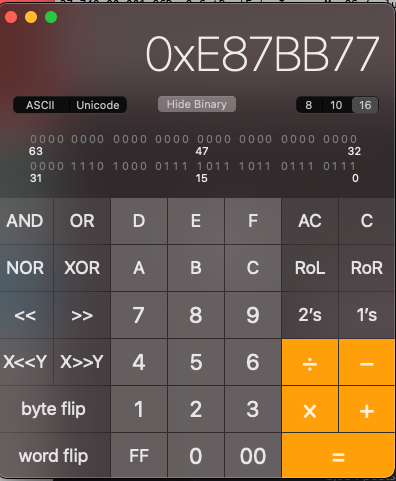
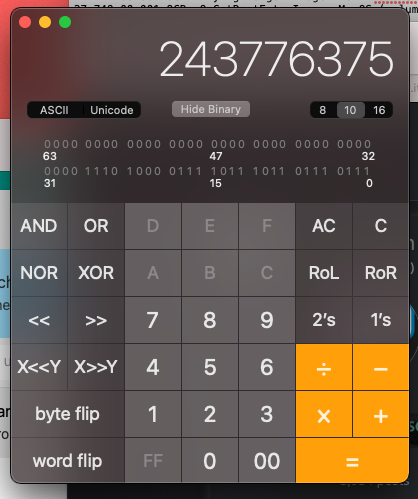
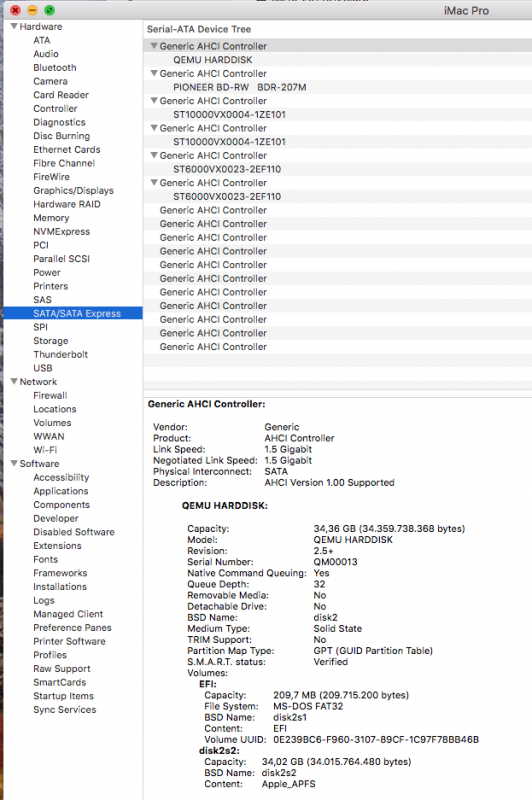
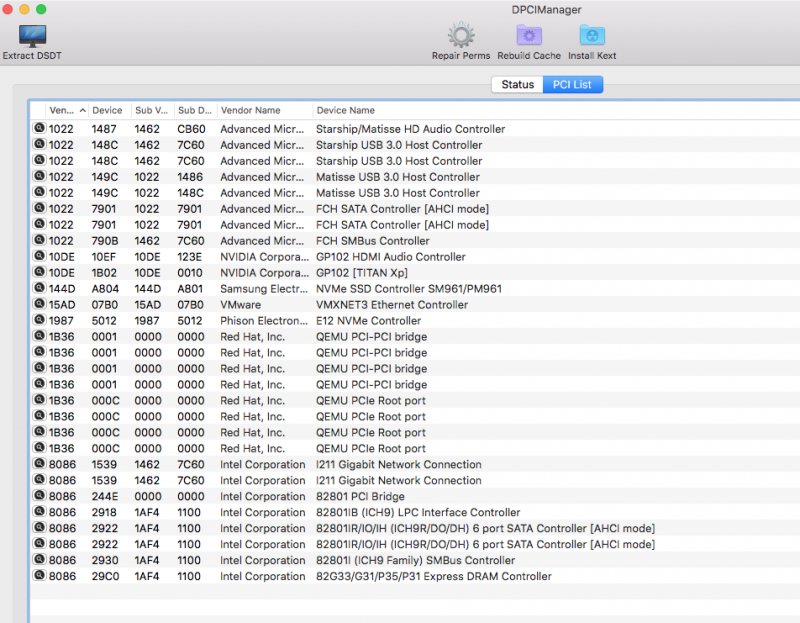
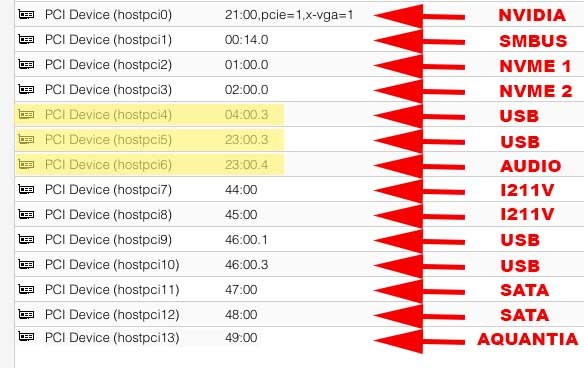
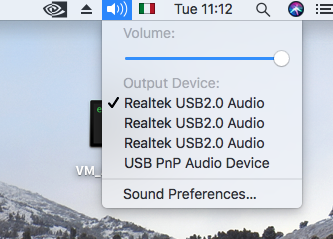
.png.3baf23b3ee150c450c1d76d0a91460e2.png)
